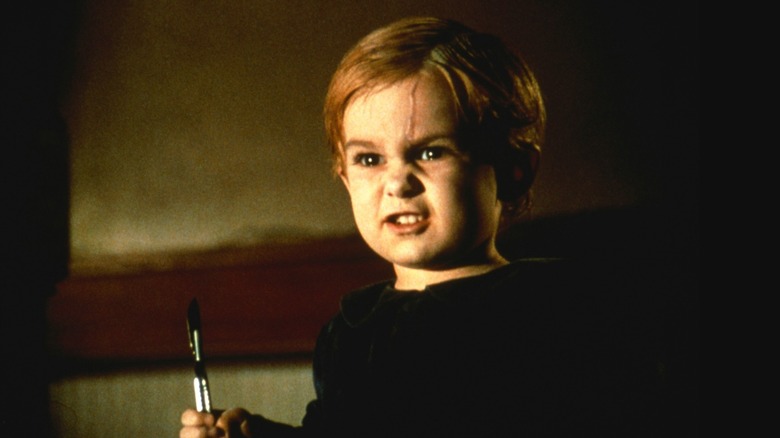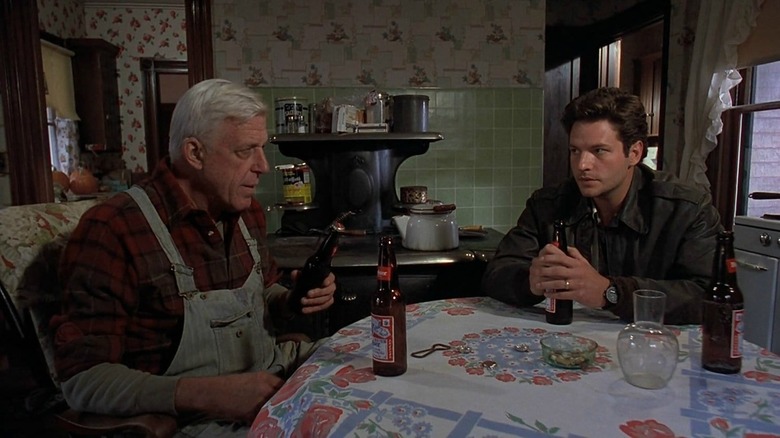Why Stephen King Wrote The Pet Sematary Screenplay Even Though He Didn't Like The Book
"Can Stephen King scare even himself? Has the author of 'Carrie,' 'The Shining,' 'Cujo,' and 'Christine' ever conceived a story so horrifying that he was for a time unwilling to finish writing it? Yes. This is it." So said the book jacket for "Pet Sematary," Stephen King's modern gothic horror novel about a burial ground that raises the dead. It was a great hook — the master of horror had written something so damn scary that even he was scared of it! But was such a claim accurate — or just good marketing material? The truth lies somewhere in the middle.
Published in 1983, "Pet Sematary" is one of King's most popular novels (it's actually my favorite of his books, and I've read 'em all, folks), and its concept of a cursed graveyard that brings the dead back to life has been fully ingrained into the public consciousness. If someone a mentions a "pet cemetery" in any context, there's a very good chance the first thing you'll think of is King's tale of terror, even if that's not the topic at hand. But if King had his way it would've never been published at all. Not so much because he thought it was too scary, but mostly because he thought it was just too damn dark. Speaking with EW in 2019, King admitted he revisited the book for the first time in years in audiobook form and came away taken aback at its bleakness. "... I listened to it, and thought, 'My God, this is just awful. It's just as dark as can be.'"
And he ain't kidding: "Pet Sematary" is all about death, and its morbid material and nasty twists and turns (including a storyline where a toddler gets run down by a truck, only to come back from the dead as a foul-mouthed cannibal zombie) tend to leave a bad taste in your mouth. In the same EW interview, King admits, "I just had the greatest time writing the book until I was done with it. And I read it over, and I said to myself, 'This is awful. This is really f***ing terrible.'" King didn't mean the book was "terrible" in terms of how it was written, but rather in regard to the ghoulish subject matter.
Despite how unpleasant it may be, "Pet Sematary" has been turned into movie twice — once in 1989, and again in 2019. And King actually penned the script for the 1989 film. But if the author thought the book was so darn awful, why did he bother to write the script? And how did the book get published in the first place?
Pet Sematary was the result of a contractual obligation
King penned "Pet Sematary" in 1979, but he was so disturbed by its shocking contents that he tucked it away in a drawer, assuming he'd never touch it again. Then the 1980s rolled around, and King moved from his old publisher Doubleday to new publisher Viking. At some point after that, the author realized that Doubleday owed him some serious money. When King was first starting his career, he signed a contract with Doubleday in which the publisher would pay him just $50,000 a year while investing anything else his books might earn. At the time King signed the deal, it sounded good. But by the 1980s, the author had become so popular that he was losing out on profits.
Things got complicated, and King was eventually told by his lawyer that the best way to get out of the whole mess and end things was to give Doubleday one final book on the condition that doing so would effectively sever the agreement. Rather than write a whole new book, King realized he still had the "Pet Sematary" manuscript sitting in a drawer. He handed it over to Doubleday, who promptly published the book in 1983.
Like most King books, "Pet Sematary" was a hit, and the movie rights were sold a year later. And Stephen King signed on to write the script.
Why Stephen King wrote the Pet Sematary script
The film rights for "Pet Sematary" were initially snatched up by none other than legendary horror filmmaker George A. Romero, who worked with King on the horror anthology film "Creepshow." Unfortunately, Romero eventually had to part ways with the project due to scheduling issues. He was replaced by Mary Lambert, and while a part of me will always wish we could've seen Romero's version of "Pet Sematary," I think Lambert did a fantastic job with the material — I saw the film at a much-too-young age and it scarred me for life.
It certainly didn't hurt that King ended up writing the script. As is usually the case, the book is better — it's richer, more detailed, and, yes, scarier. Still, King is able to translate the majority of his prose to the screen, maintaining the morbid nature of the book and resulting in a gruesome horror movie with plenty of terrifying moments (admit it: you're still freaked out by Zelda). But why did King bother to write the script at all if he was so turned off by the book?
In the EW interview mentioned above, King revealed that he wrote the script in part because he thought he might improve on the novel. "Sometimes you say to yourself, 'Maybe I can take this and make it a little bit better, or maybe I just wanna face the thing that scares me the most,'" the author said. Again: I don't think King made the book better, but I do think his script for "Pet Sematary" makes some fun changes. Most prominently is the character of Pascow, a mutilated ghost that tries to warn the main character of the horrors to come. In King's book, Pascow's only really pops up once. In the script, King has him returning multiple times and even turns him into somewhat a comic relief — one of the few funny spots in a story that's really bleak. Or as King would call it, "really f***ing terrible."


